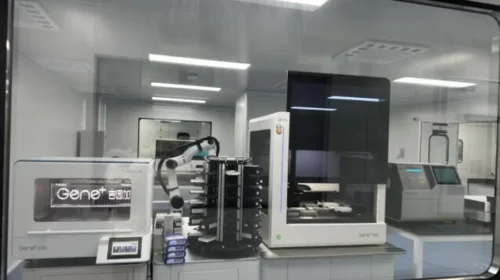Qudian: A slow-motion privatization?

The company said it is contemplating winding down its last-mile delivery service after stiff competition caused its revenue to plunge in the first quarter
Key Takeaways:
- Qudian’s revenue fell by more than half in the first quarter, as the company said it is considering closing its last-mile delivery business due to intense competition
- The company’s outstanding share count has shrunk by about a third over the last three years, and it could use its large cash holdings to keep buying back stock and privatize
By Doug Young
What do consumer loans, education, prepared foods and last-mile delivery services have in common?
They’re all businesses that Qudian Inc. (QD.US) has dabbled in over the last decade, and ultimately discarded for different reasons. The company’s most recent gambit has been last-mile delivery, as it sought to leverage its Chinese connections to help logistics companies complete delivery of their packages from China to customers in Australia and New Zealand.
Now, Qudian has revealed that its last-mile delivery business has run into massive headwinds from intense competition, causing its revenue to plunge by around half in the first quarter of this year. As a result, the company is considering giving up on its latest business foray, it said in its first-quarter earnings report released a week ago.
We certainly aren’t experts on the last-mile delivery business, so we can’t comment too specifically on what might have happened to Qudian. But China’s delivery business is extremely competitive already, dominated by about a half-dozen companies that are rapidly building up their global networks to help Chinese companies deliver millions of packages each day.
Qudian was helping some of those companies to complete their deliveries to customers in Australia and New Zealand. But it undoubtedly faced competition from local rivals with much longer operating histories and better infrastructure. What’s more, the Chinese logistics companies are also building their own local infrastructure outside China that would compete with Qudian’s services. With so many factors working against it, combined with Qudian’s own lack of history and experience, it doesn’t come as much surprise that Qudian failed.
What sets Qudian apart from many other struggling Chinese companies is its huge cash pile, which is only growing despite the company’s repeated business failures. That points to some smart investing by founder and Chairman Luo Min, who seems to be slowly privatizing his company by steadily buying back Qudian’s shares, even as he keeps looking for a viable business to pour his cash and other resources into.
“The company’s last-mile delivery business continued to face intense competition in the first quarter of 2025,” Qudian said in its latest announcement. “After assessing current market conditions, the company is contemplating winding down its last-mile delivery business. Moving forward, the company expects to remain steadfast in its commitment to executing its business transition and simultaneously maintaining prudent cash management to safeguard its balance sheet,” Qudian said.
Qudian’s shareholders didn’t seem too worried by the company’s latest failure, with its shares unchanged on the day of the latest announcement. They barely budged in the next four trading days either, indicating investors aren’t too worried about the situation.
For a company without a business model, Qudian still boasts some surprisingly big-name shareholders. Those include UBS, with 3.45% of the company’s shares, Morgan Stanley with 1.36%, Citi with 0.57% and JPMorgan with 0.36%, according to Yahoo Finance. We suspect those big names are probably less interested in Qudian’s long-term prospects and probably hope to make some quick profits if and when Luo Min tries to privatize his company.
Plunging revenue
Luo was considered an industry visionary when he launched his original fintech company in 2014 and quickly found big profits in lending money to students for purchases like smartphones and computers. But China cracked down on such private fintech lenders starting around 2017, the same year that Qudian went public on the New York Stock Exchange.
Many fintech lenders went out of business during the crackdown, and most survivors abandoned direct lending to become loan facilitators between banks and borrowers. But Qudian, flush with cash from its IPO and several years of strong business results, decided to abandon its fintech roots completely. From there it tried brief forays in education and prepared foods between 2021 and 2023, before abandoning both after one to two years due to stiff competition.
The company thought it had found a winner when it launched its Fast Horse last-mile delivery service at the end of 2022 and scaled up the business by the middle of 2023. The business briefly boomed, logging 216 million yuan ($30 million) in revenue last year, up 71% from 2023. But it began to contract in last year’s fourth quarter, and the figure fell by more than half to 25.8 million yuan in the first quarter from 55.8 million yuan a year earlier.
Not surprisingly, the last-mile delivery business lost money. But Qudian generated 165 million in interest income from its large cash holdings, which allowed it to report a 150 million yuan profit for the first quarter.
The company had 5.6 billion yuan in cash and restricted cash at the end of March, which is up quite a lot from its 3.5 billion yuan at the end of 2022. That seems to show that Luo is quite a good investor, even if he isn’t so good at running a business. What’s more, Qudian has been steadily buying back its shares. Its total outstanding American depositary shares (ADS) stood at 172 million at the end of March, down by about a third from 265 million at the end of 2022.
Luo owned about 35% of Qudian’s stock at the end of last year, according to the company’s latest annual report. That means other investors held about 112 million ADSs worth about $335 million at the company’s latest closing price of about $3. Qudian’s huge cash holdings would be more than enough to buy back all that stock at a premium, and still leave plenty for Luo to look for a new business model without having to continue as a public company.
In fact, Qudian still has $250 million left from a $300 million share buyback program it launched in March 2024. That could allow the company to keep reducing its public float by accelerating its share repurchasing, before making an offer to take the company private. Such a move would once again show how Luo is quite the savvy financier, even if he’s not very good at the education, prepared foods and last-mile delivery businesses.
To subscribe to Bamboo Works free weekly newsletter, click here





